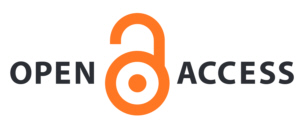- Focus and Scope
- Section Policies
- Peer Review Process
- Publication Frequency
- Open Access Policy
- Archiving
- Author Fees and Publication Charges Policy
- Author Self-Archiving Policy
- Competing Interest Policy
- Complaints Policy
- Copyright Policy
- Ethics and Misconduct Policy
- Indexing and Abstracting
- Plagiarism Policy
Focus and Scope
Section Policies
Articles
Peer Review Process
Manuscripts submitted will go through the evaluation process with a system of double-blind peer review by reviewers selected by the Editorial Board with at least one of whom is a member of the Editorial Board. Reviewers are appointed under consideration of expertise and suitability to the subject. Results of the evaluation will be communicated within 2-3 months. On the basis of reviewers’ comments and recommendations, the Editorial Board will decide whether the manuscript is accepted without revision, accepted with revisions required, or rejected. The revised manuscript should be returned to the Editorial Board within a predetermined time.
Naskah yang dikirimkan akan melalui proses evaluasi dengan sistem double-blind peer review oleh penelaah yang dipilih oleh Dewan Redaksi dan minimal satu di antaranya adalah anggota Dewan Redaksi. Penelaah ditunjuk berdasarkan pertimbangan kepakaran dan kesesuaian bidang ilmu. Hasil evaluasi akan diberitahukan dalam waktu 2-3 bulan. Atas dasar komentar dan rekomendasi penelaah, Dewan Redaksi akan memutuskan apakah naskah diterima tanpa revisi, diterima dengan perbaikan, atau ditolak. Naskah yang telah diperbaiki harus dikembalikan kepada Dewan Redaksi dalam waktu yang telah ditentukan.
Publication Frequency
This journal publishes twice a year in May and October.
Open Access Policy
This journal provides immediate open access to its content on the principle that making research available to the public supports a greater global exchange of knowledge. This access is freely available without charge to the user or his/her institution. Users are allowed to read, download, copy, distribute, print, search, or link to the full texts of the articles in this journal without asking prior permission from the publisher or the author. This is in accordance with the BOAI definition of open access.

Archiving
This journal utilizes the LOCKSS system to create a distributed archiving system among participating libraries and permits those libraries to create permanent archives of the journal for purposes of preservation and restoration. More...
Author Fees and Publication Charges Policy
This journal does not charge any author processing fees or article submission fees. There are no costs that the author is required to pay.
Author Self-Archiving Policy
This journal permits and encourages authors to post items submitted to the journal on personal websites and institutional or funder repositories after publication. The final published PDF version should be used and bibliographic details that credit the publication in this journal should be included.
Competing Interest Policy
A competing interest is anything that interferes with, or could reasonably be perceived as interfering with, the full and objective presentation, peer review, editorial decision-making, or publication of research or non-research articles" (with acknowledgment and thanks to PLoS).
Competing interests can be financial or non-financial, professional, or personal. Competing interests can arise in relation to an organization or another person.
Declaring all potential competing interests is a requirement and is integral to the transparent reporting of research.
1) Authors must declare all relevant competing interests for consideration during the review process.
2) Editors (professional or academic, paid or unpaid) and reviewers must declare their own competing interests and if necessary recuse themselves from involvement in the assessment of a paper.
3) Anyone who comments on or rates published papers in DeReMa must declare their competing interests at the time of posting their comments and/or rating.
Complaints Policy
Complaints should be sent via e-mail to the Editor-in-Chief at jurnalsenimusik@uph.edu. In your complaint, please clearly describe the nature, circumstances, and subject of the complaint. All complaints will be addressed promptly following the best practice in the ethics of scholarly journal publishing.
Copyright Policy
Authors retain copyright and grant the journal the right of first publication with the work simultaneously licensed under a Creative Commons Attribution-ShareAlike International License (CC-BY-SA 4.0) that allows others to share the work with an acknowledgment of the work's authorship and initial publication in this journal.
Authors are able to enter into separate, additional contractual arrangements for the non-exclusive distribution of the journal's published version of the work (e.g., post it to an institutional repository or publish it in a book), with an acknowledgment of its initial publication in this journal.
Ethics and Misconduct Policy
Jurnal SENI MUSIK and its editors will take reasonable "steps to identify and prevent the publication of papers where research misconduct has occurred, including plagiarism, citation manipulation, and data falsification/fabrication, among others." In no case shall DeReMa or its editors "encourage such misconduct, or knowingly allow such misconduct to take place." In the event that we are made aware of any allegation of research misconduct relating to a published article, we will follow COPE's Guidelines for dealing with allegations. [With acknowledgment and thanks to DOAJ.]
Indexing and Abstracting
Plagiarism Policy
As already stated in the above Ethics and Misconduct Policy, Jurnal SENI MUSIK and its editors will take reasonable steps to identify and prevent the publication of papers where plagiarism has occurred. Editors and reviewers will use free plagiarism screening tools such as the below to assist in this.
- Dustball: http://www.dustball.com/cs/plagiarism.checker/
- DupliChecker: http://www.duplichecker.com/
- Plagiarisma: http://plagiarisma.net/
- Quetext: http://www.quetext.com/
- Google: http://google.com